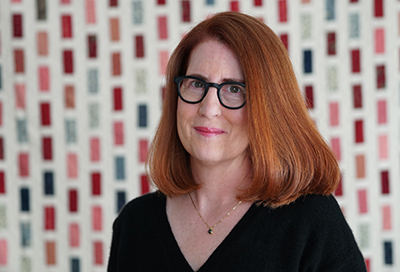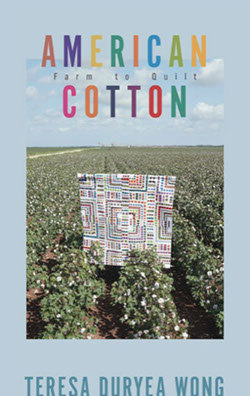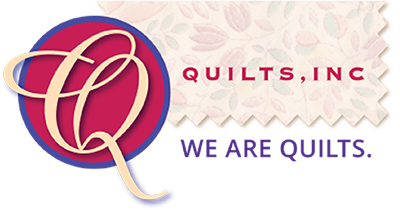Teresa Duryea Wong’s
American Cotton: Farm to Quilt

When researcher, writer, photographer, blogger, quilter, and first Bybee Quilt Scholar** Teresa Duryea Wong comes out with a new book, it is cause for celebration.
Her first two books took us to Japan and gave us insights into the extraordinary artistry and craftsmanship of that country’s quilt artists and the industries that supply them. Japanese Contemporary Quilts and Quilters: The Story of an American Import introduced the quilts and quilters of Japan and detailed their interpretation (some would even say transformation) of the traditional quilt with their fresh aesthetic and mindboggling sewing skill mastery. Cotton and Indigo from Japan takes us behind the scenes to reveal how science and technology combine with ancient knowledge and tradition to transform two plants, cotton and indigo, into fabrics and designs that are renowned throughout the world.
And now it’s time to get out your party hats, Dear Readers, because Teresa’s latest effort has been published and it brings us back to the United States to cover cotton produced in this country and the way it has been an essential element in quiltmaking. Richly illustrated with gorgeous full color photos as well as fascinating historical images, American Cotton: Farm to Quilt, takes us on a journey through the farms and textile mills of the American South, both past and present.
Right: “Mirror Ball,” by Maria Shell and photographed in a cotton field near Snook, Texas. Photo by Jimmy Wong.
She details the changing economic and social conditions that have touched every aspect of cotton production in the United States. She tells us how cotton today is used: in addition to fabrics such as those made into quilts, the majority of American-grown cotton goes to “non-wovens,” such things as batting, diapers, feminine products, airplane wings, automotive seats, carpet linings, air filters, and paper currency. We learn about the global impact on the cotton industry—80 percent of U.S. cotton is exported, and the Chinese are at the forefront of bringing back cotton mills in places like South Carolina.

Lest that all sounds too academic, rest assured that Teresa’s text is full of thought-provoking descriptions of what life was like for farm women prior to 1950 as well as today:
On the farm, there was an unwritten rule, women’s work was women’s work. Men and boys did not help inside the house. But when help was needed outside, women were expected to show up ready to do their part. None of their indoor chores stopped for farm work, nor did those chores cease when women paused briefly to give birth. Prior to 1950, a farmer’s wife might have six kids by the time she was 30 and might continue having children for another decade or more. Most farm women had little or no rest after giving birth, and the vast majority had no post-partum care from a doctor. There was simply too much work to do, and not a lot of money for medical care. In fact, farm women rarely left the farm. Going to church and the occasional social ‘quiltings’ were examples of the few times that neighbors got together and women could visit and talk to other women. (page 17)
In the dense cotton patches of Texas, the United States Department of Agriculture (USDA) estimates that 33 percent of Texas farmers are [currently] women, an astounding number…. younger women are choosing farm life, and today’s agricultural world is ready for them. There are monitoring programs for farm women at the major agricultural universities, networking organizations all over the country, and a clear path to owning and running a farm as a woman-owned professional business. (page 28)
Teresa has given us a behind-the-scenes look at the way cotton was, and now is, produced in the United States. If you care about the materials that go into the quilts you make, you will enjoy reading American Cotton: Farm to Quilt.
**The Bybee Scholar Award is presented annually on behalf of the Faith P. and Charles L. Bybee Foundation and the Texas Quilt Museum in order to recognize the study of quilts and quilting history.



